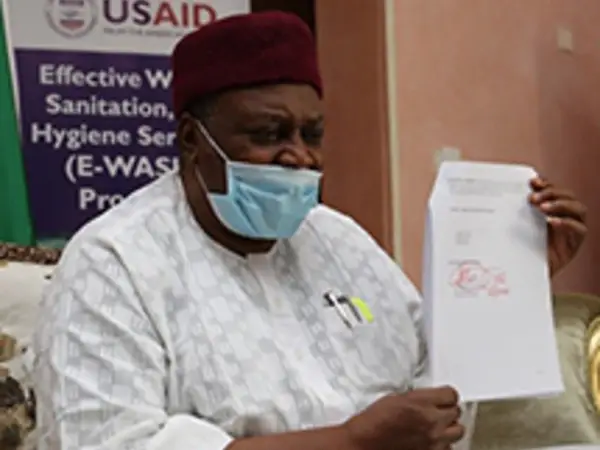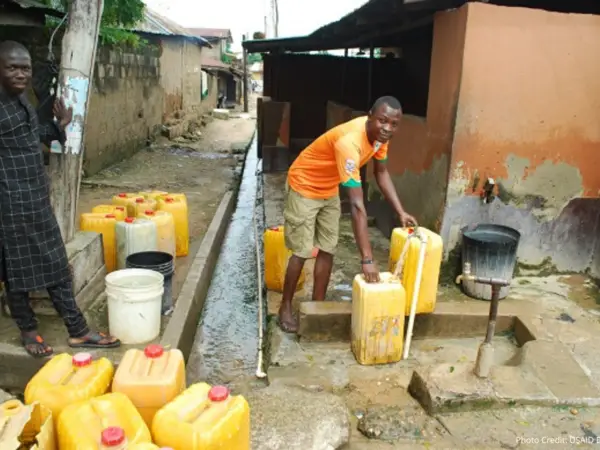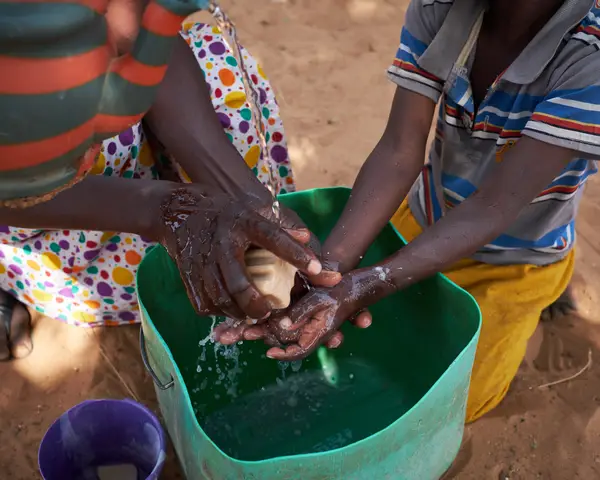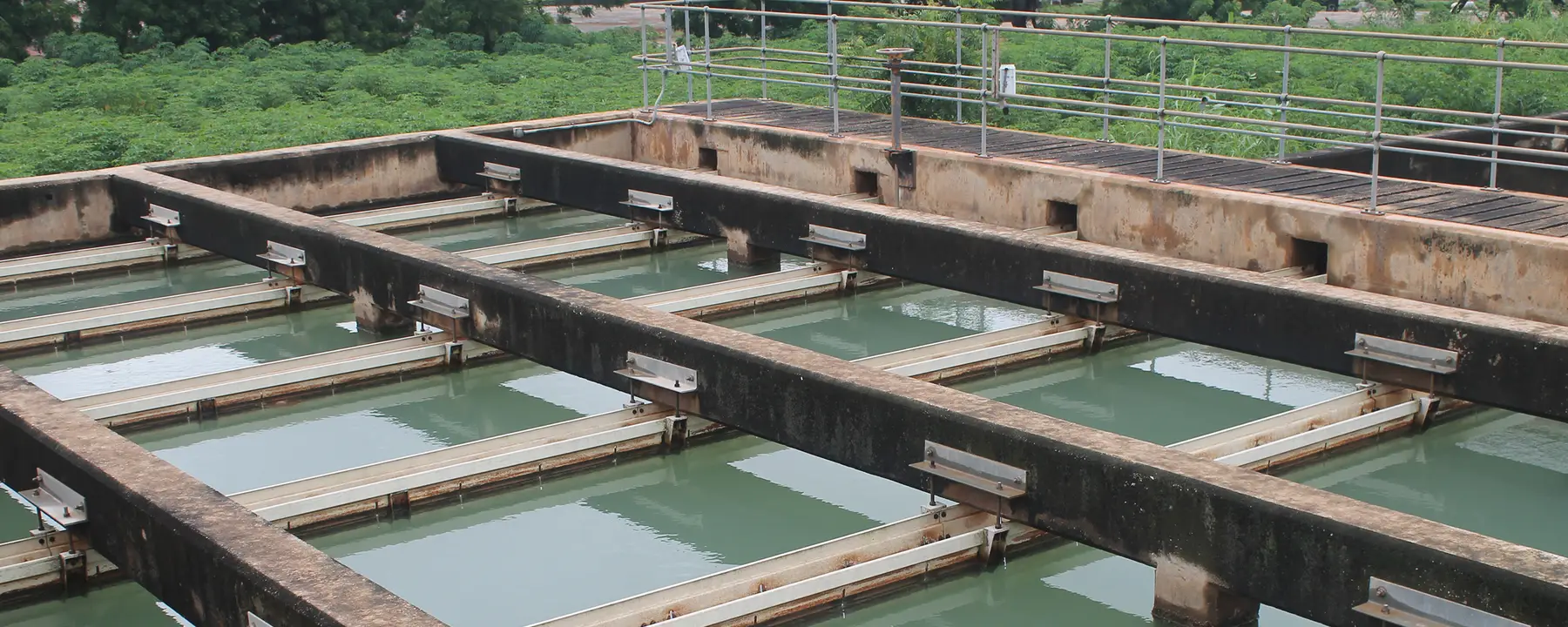Working with state water boards to deliver better urban services to the Nigerian people
Objective
To improve the availability of clean water and sanitation in Nigeria’s poorest urban neighborhoods.
Approach
We improved water delivery to 500,000 households by boosting productivity through corporatization of State Water Boards and infrastructure investments.
Impact
By adopting international best practices in water management and defining local needs, SWBs will set their states on the road to reliable and sustainable urban water and sanitation delivery.
Of Nigeria’s population of more than 203 million people, 71 million do not have access to clean water and 130 million do not have access to basic sanitation. This lack of water, sanitation, and hygiene services—exacerbated by accelerated urbanization, poor cost recovery, and weak governance and institutional frameworks—adversely affects Nigerian citizens’ health, as well as their access to educational and economic opportunities and their work efficiency and labor productivity.
Further complicating the issue, Nigeria is divided into 36 states, each of which operates with different institutional structures, power dynamics, and little or no regulatory oversight. In most states, a State Water Board (SWB) is responsible for providing water and sanitation services. On the whole, however, SWBs are hobbled by nonexistent or weak incentives for better performance, aging infrastructure, inadequate or ineffective operations and maintenance, weak institutional capacity, and little accountability to consumers.
Helping to Improve Nigeria’s Complex Water Infrastructure
In 2018, the U.S. Agency for International Development contracted RTI to implement the Effective Water, Sanitation and Hygiene Services (E-WASH) program to improve the availability of clean water and sanitation in Nigeria’s poorest urban neighborhoods. USAID E-WASH’s goal was to improve water delivery to 500,000 households by boosting the productivity and efficiency of SWBs, many of which are balanced precariously between top-down government directives and an ongoing responsibility to deliver services to millions of customers.
USAID E-WASH adopted a four-pronged approach to improving the viability of SWBs. The components of this approach included:
- Working with state governments communities and SWBs to ensure a supportive and facilitative legal and regulatory environment for production and access to safe water.
- Making SWBs financially and operationally viable through comprehensive technical assistance and by connecting them to private-sector actors and successful utility operators, thus securing long-term funding and investment options.
- Working with SWBs to invest in needed infrastructure to support water production at the state level.
- Engaging with civil organizations as advocates, as well as the donor community, to measure and adapt USAID E-WASH activities based on lessons learned and shared.
There are, of course, larger, country-level issues that impede the ability of SWBs to provide adequate water and sanitation services. Chief among these is the relentless growth in population and urban migration in Nigeria, where, in most cities, population growth has outstripped projections because of inaccurate data collection at the local level. The inability of state governments to keep stride with rapidly expanding populations results in declining quality of life and proliferating slums; meanwhile, SWBs are expected to manage growing demand from consumers while meeting unrealistic political expectations of free service delivery.
Through USAID E-WASH, we addressed the often-overwhelming challenge of urbanization. Densely populated cities offer SWBs the opportunity to test innovative methods of revenue collection, such as e-billing and geographic information system (GIS) mapping of collection routes. As utilities increased the numbers of businesses, industries, and households to which they distributed water, they increased revenue, which funded additional distribution, and increased the productivity of the Nigerian economy.
Strengthening the Corporate Structure of State Water Boards
To succeed in this challenging environment, SWBs need to be equipped with the appropriate corporate tools and strategies. To support corporatization, the project partnered with the Nigerian Bottling Company Limited (NBC), a subsidiary of the Coca-Cola Hellenic Bottling Company, which is a $6 billion entity with offices in dozens of countries around the world, including Nigeria.
As part of the partnership, SWB employees from various states were trained online by NBC employees about water quality, sustainability targets, corporate culture, approaches to climate change, management tools, monitoring and safety systems, and staff incentive structures. By learning international best practices in water management, SWBs will be better equipped to serve their customers, and set Nigeria on the road to reliable and sustainable urban water and sanitation delivery.
Achievements By the Numbers
- $9,000,000 in new funding mobilized to the WASH sector.
- Five new overarching state water laws passed for the first-time covering State Water Corporation (SWC) corporatization regulations, sanitation, and Gender Equity and Social Inclusion (GESI).
- 56 internal reforms in SWCs covering management, human resources, customer regulations, GESI, and financial management.
- 111 Collaboration, Learning, and Adapting (CLA) events facilitated to share knowledge, best practices, lessons learned and research findings in WASH.
- 744 media and knowledge management products on WASH-related topics disseminated via online, print media, social media, radio, TV, and webinars/conferences.
- 34x increase in the drinking water quality compliance rate.
- 25 Community Organization (COs) and other non-government organizations engaged to support reform, build local capacity, and promote innovation.
- 353 community-based WASH events facilitated targeting vulnerable groups to promote their inclusion specifically.
Learn More About USAID E-WASH

USAID Partners with Imo to Improve WASH State to ‘Corporatize’ Water Board for Better Performance

USAID Partners with Nigeria's Taraba State to Improve Delivery of Water and Sanitation Services

With USAID Support, Nigeria’s Niger State Creates New Water Corporation to Improve Service Delivery

USAID E-WASH Announces Partnership with Nigerian Bottling Company Limited, Bottling Partner of Coca-Cola Nigeria, to Improve Urban Water Services

Related Insights
Creating sustainable water and sanitation sectors is about more than pumps or sewerage systems — it’s about people. In order to get water from source to tap in an equitable and sustainable way, it must flow through transparent and accountable institutions.
- U.S. Agency for International Development

